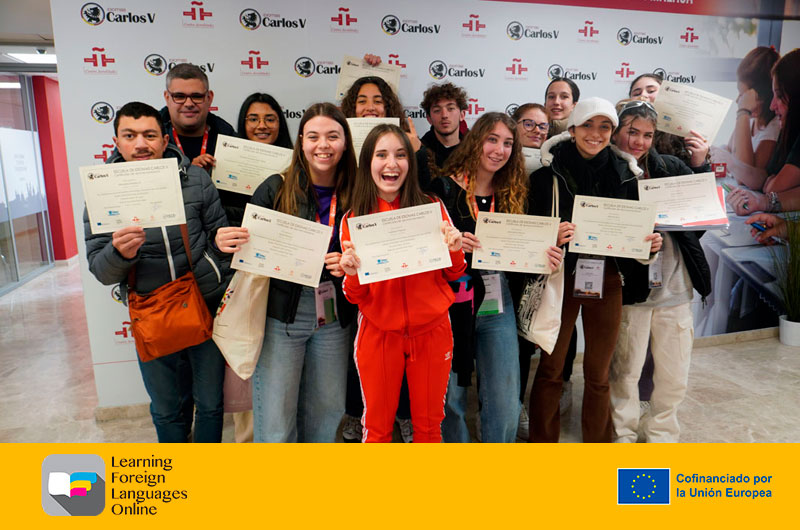Por su interés y relación con el aprendizaje de idiomas compartimos en nuestro blog este artículo de Kelsea Mucherino, coordinadora Erasmus de Eurospeak, uno de los socios participantes en Learning Foreign Languages Online (LFLO), publicado originalmente en la web del proyecto.
Aprender idiomas online: cómo conocer una lengua sin acceso a un hablante nativo
¿Cómo podemos aprender a comunicarnos sin interactuar?
Por Kelsea Mucherino
En el transcurso de la pandemia del COVID-19, ha habido una pérdida generalizada de trabajo en toda Europa, lo que ha llevado a miles de personas a buscar empleo. Esto ha provocado un aumento masivo en el número de personas que han decidido emprender la abrumadora tarea de mejorar su nivel de alguna lengua extranjera por medio de aprender idiomas online. Esto está respaldado por evidencias de Google, entre el inicio de la pandemia y ahora:
- “Aprendizaje de idiomas con YouTube” ha aumentado un 750%
- “Soluciones para el aprendizaje de idiomas” en un 450%
- “Mejores herramientas de aprendizaje de idiomas” en un 300%
- “Aprender idiomas con Netflix” en un 250%
A estas alturas, muchas personas se han dado cuenta de que tener un idioma extranjero bajo la manga puede ser una ventaja competitiva a la hora de solicitar puestos de trabajo, y también abre la posibilidad de trabajar a distancia (o incluso cara a cara, eventualmente) en todo el mundo. Por lo tanto, no sorprende que muchas personas hayan intentado hacerlo mientras hubo restricciones y estuvieron pegadas a las pantallas de sus dispositivos electrónicos.
Desafortunadamente, aprender idiomas online, saber cómo comunicarse en un idioma extranjero sin interacción humana, es muy difícil. Incluso con todo el tiempo y la motivación del mundo, no es una tarea fácil aprender un idioma extranjero sin estar inmerso en el idioma o tener acceso a hablantes nativos para practicar las habilidades. Aunque memorices una gran cantidad de palabras de vocabulario y reglas gramaticales, no será suficiente para poder comunicarte en un idioma extranjero. El aprendizaje de idiomas es de naturaleza interactiva, pero ¿qué hacemos cuando falta la pieza de la “interacción”?
Afortunadamente, es muy posible perfeccionar las habilidades comunicativas, incluso sin estar en presencia de alguien con quien se pueda practicar. Incluso si actualmente estás tomando clases de idiomas extranjeros, puede que te resulte especialmente difícil poner en práctica lo que has aprendido fuera de clase. A continuación, se muestra una actividad que puedes realizar por tu cuenta para desarrollar habilidades de comunicación en un idioma extranjero utilizando los recursos que tienes disponibles.
Antes de comenzar a practicar idiomas online, es importante tener en cuenta que la comunicación con éxito requiere una parte diferente de tu cerebro a la que almacena el conocimiento de la gramática y el vocabulario y, por lo tanto, requiere que se utilicen diferentes técnicas de “estudio” mientras se aprende. Recomendamos encarecidamente complementar el aprendizaje comunicativo con ejercicios gramaticales concretos y explícitos para ayudar a ganar precisión al hablar, pero el siguiente método está diseñado para ayudar a acceder a la parte de su cerebro que se ocupa del aprendizaje contextual en lugar de la parte donde la memorización (vocabulario y reglas gramaticales) se almacenan.
Con este método, te alentamos a concentrarte más en frases y unidades de varias palabras en lugar de palabras individuales para obtener una “sensación” general del idioma. Esto te ayudará a desarrollar algo conocido como selección de tipo nativo, o la capacidad de elegir la forma de sonido más “natural” para decir una oración. Las investigaciones han confirmado que ver la televisión y las películas en el idioma de destino al menos compensa en cierta medida la falta de “entrada auténtica”. Así puedes proporcionar un contexto para el aprendizaje de las funciones sociales de una lengua. Aplicar la siguiente metodología de aprendizaje es, por lo tanto, una forma divertida y efectiva de obtener exposición al idioma de destino mientras aumenta tu repertorio de vocabulario y frases que puedes entender y usar mientras interactúa en el futuro.
Metodología para aprender idiomas online
- Comienza identificando una película o serie interesante que provenga directamente de la comunidad del idioma de destino. Es imperativo que la película o serie que elijas sea una fuente auténtica, es decir, realizada por hablantes nativos del idioma de destino, de modo que tengas una fuente nativa de entrada para el aprendizaje. Asegúrate de que haya subtítulos disponibles tanto en tu lengua como en el idioma de destino. Nota: Sugerimos hacer este ejercicio usando una serie con episodios de entre 20 y 30 minutos de duración, pero si eres valiente y quieres un desafío, puedes probar con una película de larga duración o episodios de televisión más largos.
- Ahora, el próximo paso depende de tu nivel de idioma. Si eres un principiante, comienza viendo un episodio o una película con subtítulos en tu idioma nativo primero. Debes poder comprender lo que sucede en la historia antes de intentar concentrarte en aprender el idioma. Hazte una idea general de la trama y trata de prestar atención a qué palabras y frases se usan y en qué situaciones. Si eres un estudiante de nivel intermedio-alto o avanzado, puedes omitir este paso si te sientes lo suficientemente cómodo e ir directamente al siguiente paso.
- Una vez que tengas una comprensión de la historia de lo que estás tratando de ver, puedes comenzar a concentrarte en el idioma. Cambia los subtítulos al idioma de destino y vuelve a ver el mismo episodio o película. En esta ocasión, tendrás un conocimiento previo de la trama, lo que te permitirá centrar tu atención en el propio idioma de destino.
Deberías poder reconocer palabras y frases en el idioma de destino que recuerdes de tu última visualización. Como un ejemplo muy básico, si vio una película sobre un gato, pero no conocía la palabra “gato” deberías poder reconocer fácilmente la palabra ahora cuando se hace referencia al “gato” en el episodio.
Nota: No te preocupes si todavía no entiendes mucho de lo que se dice, ya que esto es común: simplemente estar expuesto al idioma y saber lo que está sucediendo en la historia es parte del viaje del aprendizaje. Vuelve a ver el episodio con subtítulos en tu idioma nativo y en el idioma de destino tantas veces como sea necesario; esto será diferente para cada uno.
- Una vez que tengas una comprensión de la historia de lo que estás tratando de ver, puedes comenzar a concentrarte en el idioma. Cambia los subtítulos al idioma de destino y vuelve a ver el mismo episodio o película. En esta ocasión, tendrás un conocimiento previo de la trama, lo que te permitirá centrar tu atención en el propio idioma de destino.
- La siguiente parte es: repetir, repetir y repetir, algo que puedes hacer al aprender idiomas online. Esto significa identificar nuevas frases y expresiones que desees aprender y hablar un poco en voz alta contigo mismo una y otra vez. Puede parecer incómodo, pero confía en nosotros, esta es una excelente manera de mejorar tus habilidades de comunicación. Una vez que hayas identificado las frases que te gustaría aprender, escríbelas junto con sus significados. Vuelve a reproducir esta parte particular del episodio una y otra vez y trata de imitar la frase exactamente como se dice en la pantalla. Mientras repites, pregúntate lo siguiente:
¿En qué situación se usa esta palabra o frase?
¿Cómo pronuncian los hablantes nativos esta palabra o frase?
¿Cómo cambia su voz al decir la frase (entonación, tono, etc.)?
¿Existe una traducción directa de esta palabra o frase en mi idioma?
Responder estas preguntas te ayudará a mejorar tu pronunciación, por supuesto, pero un beneficio adicional es que también te ayudará a comprender la pragmática de las frases, es decir, en qué contextos sociales deben usarse y qué funciones sociales cumplen. La repetición es esencial, ya que sirve para mantenerla en tu memoria. Sin duda, tomarse el tiempo para practicar las habilidades de comunicación usando la televisión y el cine puede enseñarte nuevo vocabulario, expresiones, modismos e incluso ayudarte a comprender el uso de ciertas estructuras gramaticales. Un beneficio adicional es que, al estar expuesto a medios auténticos en el idioma de destino, también tendrás la oportunidad de aprender sobre la cultura.
Mantente actualizado con el proyecto LFLO para obtener recursos útiles que te ayudarán en el viaje del aprendizaje de idiomas online. Puedes obtener más información en en la web de LFLO y no olvides seguirnos en nuestras redes sociales:
Si estás buscando mejorar tus habilidades lingüísticas en diferentes idiomas online, estás en el lugar correcto. Ofrecemos una amplia variedad de cursos de idiomas diseñados para ayudarte a alcanzar tus objetivos de manera efectiva y divertida.
¿Quieres aprender español para comunicarte con confianza en tu entorno laboral o personal? ¿O quizás estás interesado en aprender inglés para viajar o estudiar en el extranjero? Sea cual sea tu objetivo, nuestros cursos de idiomas están diseñados para satisfacer tus necesidades y ayudarte a alcanzar tus metas.
Nuestros cursos están impartidos por profesores altamente capacitados y experimentados que te guiarán a lo largo de todo el proceso de aprendizaje. Además, nuestros cursos son flexibles y personalizables para adaptarse a tus necesidades y horarios.
No importa si eres principiante o si ya tienes un nivel avanzado, nuestros cursos de idiomas están diseñados para satisfacer tus necesidades y ayudarte a alcanzar tus metas. Así que no lo pienses más y únete a nuestra comunidad de estudiantes de idiomas hoy mismo. ¡Te esperamos en Idiomas Carlos V!








